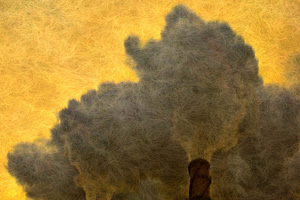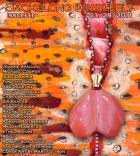I’m very curious about how this story came to you. Was there a single idea that served as inspiration?
I love hearing a new word — that first moment when it hits your ear, but your brain has no way to process it and so has no response to it. It’s a moment of great creative freedom. When I first heard the three ayervedic personality types — vata, pita and kapha — I was enchanted with the sound of them, repeating them to myself over and over. When I heard descriptions of their characteristics, I was drawn to kapha because it was filled with oppositional elements: brooding yet loving, loyal yet manipulative. What great grist for a story. So many of our life experiences, I think, have these sorts of flip sides.
There is such a sense of longing here; the narrator is expected to meet everyone else’s needs, while her own go unmet. What do you think the narrator longs for? Intimacy? Peace and quiet? Something else? (I wondered, given how the positive and the negative intermingle here, if she could even verbalize her need.)
Funny you should ask. At the time I wrote this piece, I was preparing to teach Kate Chopin’s The Awakening to an American Literature class at a local college. Chopin’s subtitle for that novel is, “A Solitary Soul.” The novel is, to me, about a woman searching for meaning in her existence. More than meaning, really, she’s looking for an ecstatic existence. For a while, she seems to think it is sexual intimacy that she wants, but, by the sad end of the novel, she knows it’s more than that. My narrator is in much the same space — I don’t know that she can articulate what an “ecstatic existence” is, but it has to do with both freedom (from having to meet everyone else’s needs) and some sort of intimacy with her own existence. I plan to ask my students at least once during each class on the book what they think Edna (the main character) wants. I’m hoping for a really good answer to steal.
I love the contrasting luck and misfortune in this story: the dollar bill with the gum stuck to it, the gift of dead mice, the old boyfriend and his stunning wife.
I loved writing those contrasts; that was the piece of the story that came easiest to me. I don’t know: Keen sense of irony? Perverse sense of humor? Writing them was like playing with two magnets, facing the same poles toward each other: you can feel that invisible cushion of resistance between them and that feeling is just so fascinating to me it’s hard to stop playing.
To me, there is also a slight suggestion of the magical here in how people assume the narrator has so many different talents. As you wrote this, did you imagine something in her appearance/demeanor that might draw people in so strongly?
Any time I am transported out of my skin by a word, magic does happen. That’s not the magic of this story, but the magic of writing it. I imagined my narrator, actually, to be very average in appearance and demeanor. If I were going to write a longer story with this narrator, she would be the kind of woman to whom some really egotistical guy would say, “You know, you really are very attractive,” as though this was a great insight and a revelation to both of them. My narrator knows she has this power but has (surprise) mixed feelings about it. The rest of the world — except her poor missing family — has not caught on. The final contrast, I think, is that to become kapha, to be desired by all, one has to be alone.
Do you have people you consider writing mentors? A writing group in Boston or online?
I studied poetry with Frank Bidart at Wellesley and think of him and Pam Painter, who taught me microfiction at Emerson, as my two creative mentors. I try to get down to the Provincetown Fine Arts Work Center whenever I can and constantly beg Pam Painter to help me craft a better story. Otherwise, I rely not so much on other writers, but on people who read a good deal for feedback.



 The SmokeLong Grand Micro Contest (The Mikey) is now an annual competition celebrating and compensating the best micro fiction and nonfiction online.
The SmokeLong Grand Micro Contest (The Mikey) is now an annual competition celebrating and compensating the best micro fiction and nonfiction online.